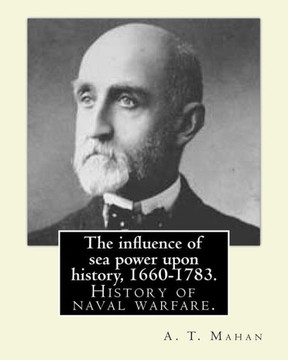The Influence of Sea Power Upon History: 1660-1783 is a history of naval warfare published in 1890 by Alfred Thayer Mahan. It details the role of sea power during the seventeenth and eighteenth centuries, and discusses the various factors needed to support and achieve sea power, with emphasis on having the largest and most powerful fleet. Scholars consider it the single most influential book in naval strategy. Its policies were quickly adopted by most major navies, ultimately leading to the World War I naval arms race Mahan formulated his concept of sea power while reading a history book in Lima, Peru. The book was published by Mahan while president of the US Naval War College, and was a culmination of his ideas regarding naval warfare. Mahan began the book with an examination of what factors lead to a supremacy of the seas, especially how Great Britain was able to rise to its near dominance. He identifies such features as geography, population, and government, and expands the definition of sea power as comprising a strong navy and commercial fleet. Mahan also promotes the belief that any army would succumb to a strong naval blockade. The book then goes on to describe a series of European and American wars and how naval power was used in Timeliness contributed no small part to the widespread acceptance and resultant influence of Mahan's views. Although his history was relatively thin (he relied on secondary sources), the vigorous style and clear theory won widespread acceptance of navalists across the world.[8] Sea power supported the new colonialism which Europe and Japan were imposing on Africa and Asia. Given the very rapid technological changes underway in propulsion (from coal to oil, from reciprocating engines to steam turbines), ordnance (with better fire directors, and new high explosives) and armor (hardened steel), the emergence of new craft such as destroyers and submarines, and the development of radio, Mahan's emphasis on the capital ship and the command of the sea came at an opportune moment. Mahan was initially introduced to the German navy by the strategist Ludwig Borckenhagen, in a series of influential papers. Subsequently his name became a household word in the German navy, as Kaiser Wilhelm II ordered his officers to read Mahan, and Admiral Alfred von Tirpitz (1849-1930) used Mahan's reputation to finance a powerful surface fleet. His ideas decisively shaped Japanese naval doctrine, especially in the fleet actions of World War II. Between 1890 and 1915, Mahan and British admiral Jacky Fisher (1841-1920) faced the problem of how to dominate home waters and distant seas with naval forces not strong enough to do both. Mahan argued for a universal principle of concentration of powerful ships in home waters and minimized strength in distant seas, while Fisher reversed Mahan by utilizing technological change to propose submarines for defense of home waters and mobile battle cruisers for protection of distant imperial interests. The French at first adopted Mahan's theories. French naval doctrine in 1914 was dominated by Mahan's theory of sea power and therefore geared toward winning decisive battles and gaining mastery of the seas. But the course of World War I changed ideas about the place of the navy, as the refusal of the German fleet to engage in a decisive battle, the Dardanelles expedition of 1915, the development of submarine warfare, and the organization of convoys all showed the navy's new role in combined operations with the army.
| Author: A. T. Mahan |
| Publisher: CreateSpace Independent Publishing Platform |
| Publication Date: Jun 17, 2016 |
| Number of Pages: 326 pages |
| Language: English |
| Binding: Paperback |
| ISBN-10: 1534726047 |
| ISBN-13: 9781534726048 |


